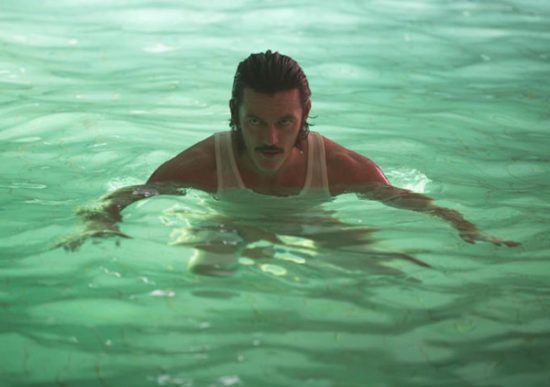Review: High-Rise
Ten minutes in to High Rise, Tom Hiddleston nonchalantly pulls the rubberised facial muscles from the skeleton of a cadaver. This graphic scene sets the tone for the latest piece from Ben Wheatley, which is also a direct adaptation from J G Ballard’s book.
Set some time in the late Seventies, Hiddleston plays Dr Robert Laing, a surgeon who moves into an apartment on the middle floors of a brand new high rise block of luxury flats in an unnamed British city. Laing meets Sienna Miller’s Charlotte and her son who live above him, plus a fleet of families living on the lower levels, including Wilder (Luke Evans) and his wife Helen (Elisabeth Moss). Laing is invited to the palatial upper floors and meets the Architect (Jeremy Irons) and his wife Ann (Kelley Hawes) who enjoy a very different existence to those two hundred floors below. As the lower levels find themselves with plumbing problems not affecting those above, a class war develops within the building.
High Rise’s beauty kicks in when things get nasty. This menagerie cannot bear to part with the block and spend their time creating treaties and fighting for space. High Rise was always intended as a giant allegory for the class system, and it does its job well. All of the characterisation is brilliant, from Laing going slightly mad as he struggles to maintain good relations with all factions, to Wilder wanting to fight for the rights for the common man without being afraid to get his hands very very dirty. James Purefoy as posh Pangbourne revels in playing a beastly character who will rape and pillage his way through the building for sport.
There’s a fair amount of homage from Wheatley, whether this was intended or not. Laing is an English Patrick Bateman and some of the more graphic scenes borrow from the clear eye of Stanley Kubrick, especially once violent eruptions turn sexually proprietorial.
Although very enjoyable, in places High Rise feels rushed, particularly the mid point in the film where rival groups form. Wheatley uses a quick and hackneyed montage to show the mild-mannered inhabitants turn to aberrations, when greater joy would be had in teasing this out. Hiddleston is marvellous, but it is Luke Evans who is riveting.
And of course the Seventies source material isn’t kind to women. Hawes, Moss and especially Miller don’t have nearly that much to do except for suffer abuse at the hands of the male leads. I suppose this could be an allegory for suffering at the hands of the patriarchy, but really I think Wheatley didn’t even consider it and wanted to have fun watching (his take on) Thatcher’s Britain burn.
Fun, brutal and insightful, High Rise is a good watch, but not Wheatley’s best work.










